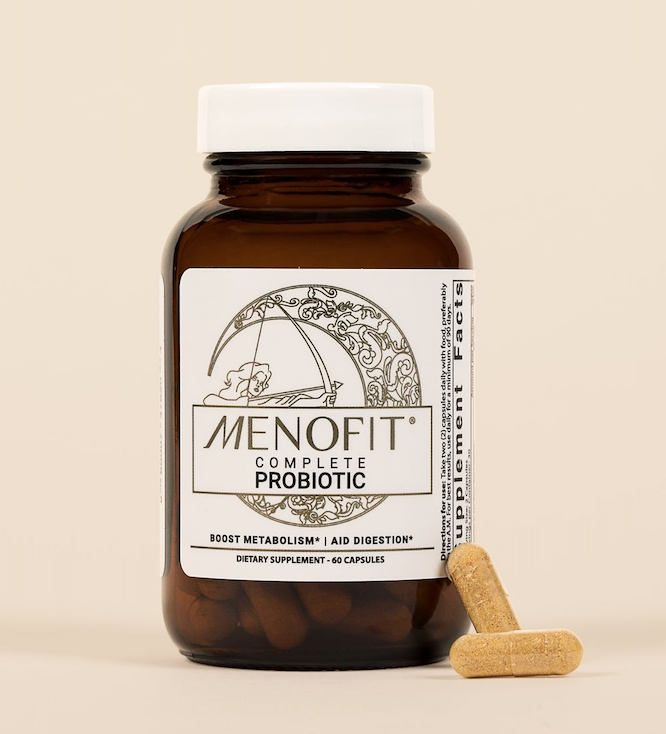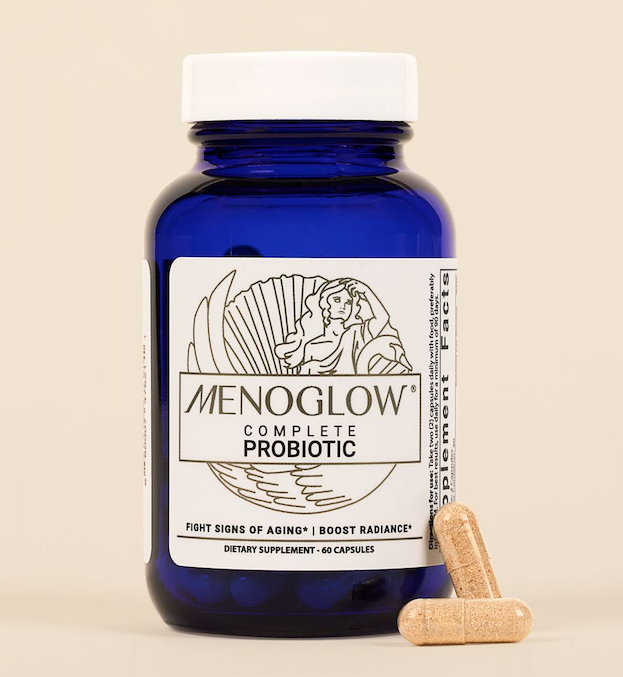No sleep. Weight gain. Hot flashes. Sound familiar? If so, you’re entering the most significant hormonal transition of your life: menopause. Before you get there—meaning, your period will have stopped completely for twelve consecutive months—menopause-related discomfort may prevent you from doing the things you love.
Understanding the myriad reasons your body responds to the decrease in estrogen that occurs during the menopausal transition places you one step closer to finding relief from the aforementioned symptoms. And just as they affect temperature regulation centers in the brain, hormonal fluctuations can affect the bacteria living in your vagina and gut.
The community of bacteria known as the microbiome, or flora, lives throughout the body, including in your gut, vagina, and on your skin. Flora is a mixture of good and bad microorganisms. It’s this balance of good versus bad that contributes to your health by keeping every part of your system in shape, from your brain to your heart and beyond. “When we age, hormone regulation and gut health are so important because they affect our immune system, brain health, mood, sleep, skin, and metabolism,” says Maggie Ney, ND, a licensed, board-certified naturopathic doctor who specializes in female hormone balancing and healthy aging and is the founder and co-director of the Women’s Clinic at the Akasha Center for Integrative Health in Santa Monica, CA.
How Menopause Affects Gut Health
You may be familiar with how your gut’s microbiome contains many tiny organisms all through your GI tract, many of which you need for optimum health. Research has found that around the time of menopause, there’s a lower amount of diversity in women’s gut microbiome, which increases your risk of illness.
Your vagina also has flora. Like the gut, it contains good and bad bacteria. During the menopausal transition, this ratio of helpful to unhelpful bacteria can be upended. For instance, a healthy vagina contains microorganisms from the Lactobacillus genus of bacteria—including Lactobacillus gasseri, Lactobacillus iners, and Lactobacillus jensenii.
When their levels are disrupted, vaginal infections and sexually transmitted infections can be more common. “For vaginal health, we know that estrogen levels drop during perimenopause and menopause,” says Melissa Herbst-Kralovetz, PhD, director of a women’s health research program in Phoenix. “This may negatively impact the amount of glycogen you have. Glycogen is a food source for healthy bacteria, so this is not a good thing. We also know that bacteria in the gut can impact estrogen levels, and that can therefore impact the number of vaginal bacteria you have, and the thickness of the epithelium barrier, which line the gut and vagina—these cells and are the first responders if any pathogens enter your body.”
This is when taking probiotics can come to the rescue.
Probiotics: What They Are and What They Do
“Probiotics are live, beneficial bacteria that contribute to health in the gut and vagina,” Herbst-Kralovetz says. “They can exclude bad bugs and pathogens by taking up space in your body, producing antimicrobial compounds, and enhancing your immune activity. Probiotics also promote a strong barrier of epithelial cells.”
Probiotics don’t directly stop the symptoms of menopause; however, these tiny consumable microorganisms may be able to lessen them. They can positively impact gut and vaginal health in general and specifically at menopause: “Theoretically, probiotics in your gut can promote lots of different bacteria, which is a good thing,” Herbst-Kralovetz notes. “They could positively impact both the gut and vagina through this impact on estrogen. Taking oral probiotics most likely positively impacts gut health, and indirectly, vaginal health.”
Finding the Right Probiotic
Probiotics consist of different strains that will impact your body in different ways. To figure out what kind might help as you experience the menopause transition, you need to get strain-specific. “It’s important to look at the acute symptoms you’re experiencing,” says Ney, Medical Advisor for MenoLabs, a wellness company that specializes in creating supplements that help women through the menopause transition and beyond.
For instance, if you’re experiencing brain fog, preliminary research has found that supplementing with a probiotic containing Lactobacillus plantarum may enhance memory and cognition while alleviating anxiety. Or, if you’re struggling with maintaining your weight, other studies suggest that less gut microbiome diversity with low levels of the same strain may exacerbate the issue.
“Ask yourself, ‘What are my goals?’” says Ney. “If your answer is, ‘I want to sleep because I’m not sleeping,’ then you can look at a supplement to help you do that, and talk to your doctor for guidance.” Your doctor may suggest a probiotic product with multiple strains, like those made by MenoLabs, to cover multiple symptoms.
MenoLabs offers two probiotics that address menopause symptom relief. MenoFit for Weight Management is designed to relieve hot flashes, night sweats, weight gain, and more. MenoGlow also relieves hot flashes, plus helps with signs of hormonal change like brittle hair and nails, wrinkles, acne, and more.
When shopping, look at the CFU number on the label of any supplement you are considering. “CFU” stands for “colony-forming units,” which is the number of alive and active microorganisms in the product. The higher the CFU, the better: “Think billions,” says Herbst-Kralovetz. “Also, get one with clinically studied strains.” MenoFit and MenoGlow contain 25 billion CFU and 20 billion CFU, respectively.
Analyzing ingredients is also important. “Look at the inactive ingredients,” stresses Ney. “If you see that a product contains dyes and other fillers, that’s not really needed.”
The bottom line: The right kind of probiotic for you can help make this stage in your life a positive, healthy new beginning.



